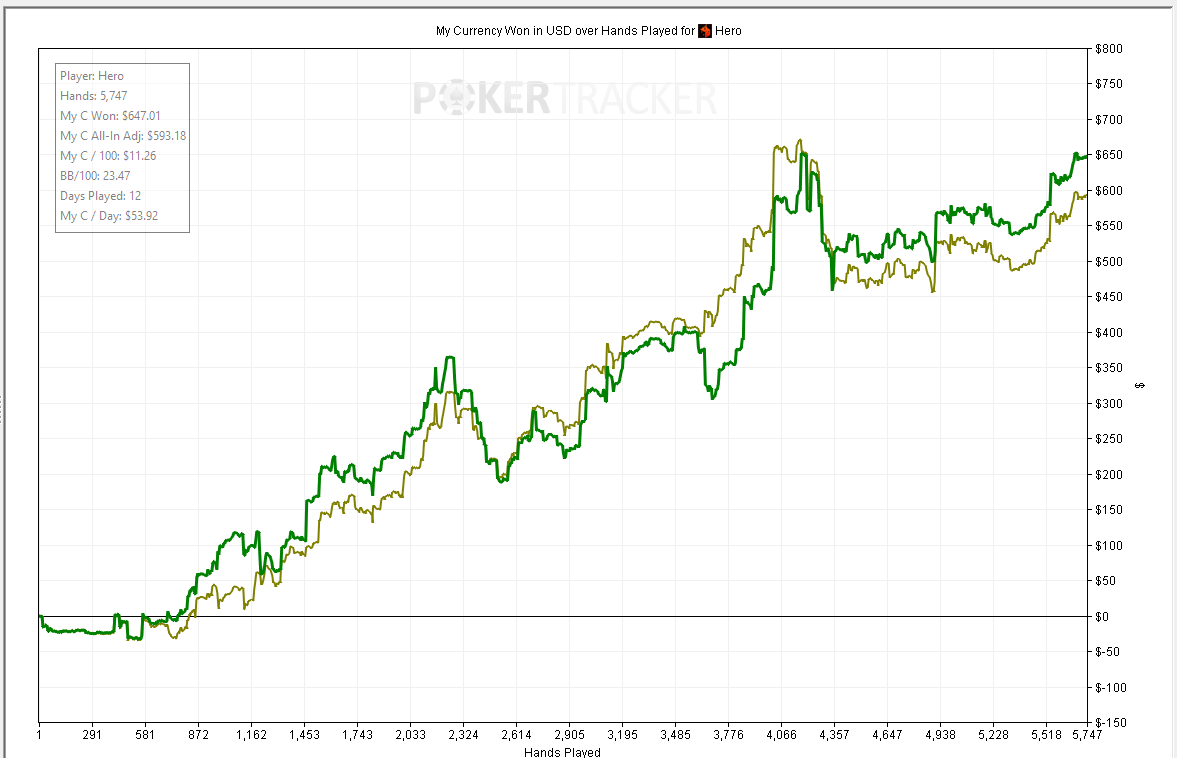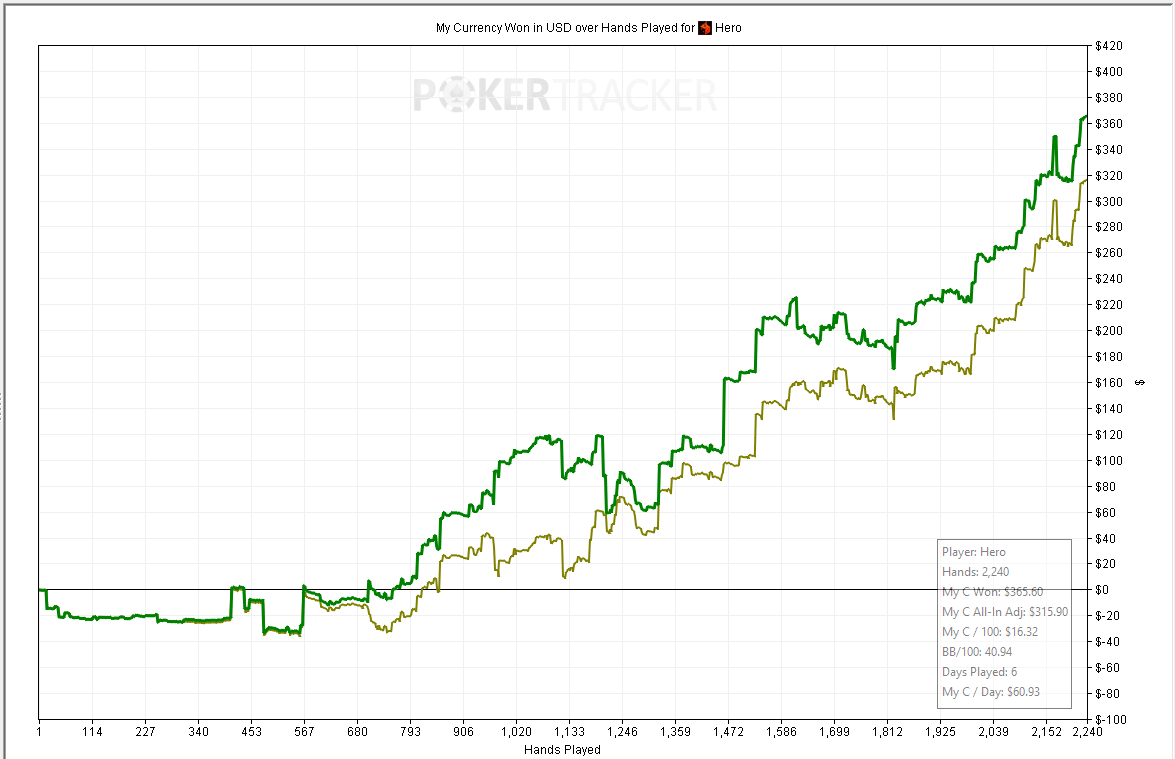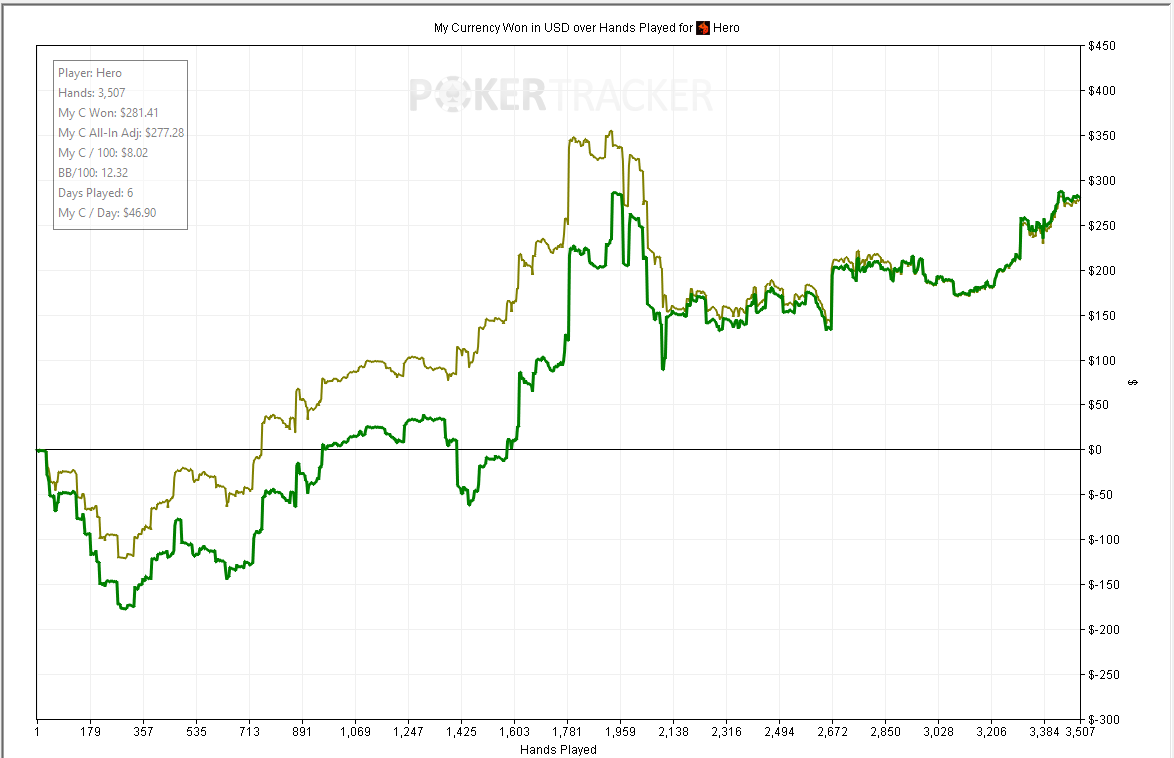poker diaries, volume 1

Things fell through this summer. I thought I would be making good money at an internship, but due to a combination of bad luck and some unforced errors (I’ve never been good at dealing with bureaucracies), I found myself with an unexpected summer off. What would I do with my time off? Well, I decided I wanted to spend my time doing something I love, and I also wanted to make money doing it. And anyone that knows me knows that I really only left one option: poker.
I’ve been wanting to take a stab at playing professionally for a couple years, and this is my opportunity. For the first time in my life poker is my sole source of income, and I’m cataloging my experiences and struggles. I’ll explaining what I’m working on, delving into topics ranging from lifestyle to in-depth strategy to writing software to analyze poker sims.
my first weeks
Today marks the end of my second week of playing professionally. I’m still playing smaller stakes to get my game back into shape ($25 and $50 buyins). I’m only about 5,700 hands in, not much in online poker terms, but so far things feel good. I’m thinking well, reasoning through spots, and I’m able to read many of my opponents hands.
I’m slowly getting my volume up, but it’s slow going. My first milestone will be 5k hands per week. The first week I got in 2.2k hands, and this week I got to 3.5k hands. This week I could have gotten more hands but I had sleep trouble earlier in the week which led to lower volume.
I ran pretty hot in my first week. A lot of the volume was at 25nl (that is, $25 buyins), and I had some hands at 50nl as well.

I ran good and played pretty well, though I made lots of mistakes. But some nights it feels like people just want to give you their money, and who am I to say no?
Even though this was a great first week it just demonstrates how hard this is going to be. I ran great, but at the stakes I’m playing I’ll need many more hours of grinding to make ends meet. One way around this is to move up stakes, and I’ll be doing that soon once I feel better about my game and have studied a bit more.
My second week was a bit tougher.

I started out playing a 300 hand session on Monday night, signing on at around 1am. I was tired and honestly shouldn’t have been playing. I ran ice cold, and played pretty bad too. I ran TT and JJ into AA four times. One hand I flopped a set on KJT. The turn was a Q, AA shoved, and I snap folded my set of jacks (I played this hand perfectly). There were a number of other gross spots. One hand my software malfunctioned and I bet the wrong size, and the other player ended up runner-runnering a 5 high flush vs my aces. Just a freak hand, nothing to be done, but it really added insult to injury.
After about an hour I was down $150 and I sat out. It was a tough way to start the week, and tougher still I was having sleep issues, making me miss most of my volume on Thursday. Friday and Saturday I had some more hands and ran quite a bit better until I cooled off today (Sunday). I played 1.1k hands and it was pretty break-even until the last little bit when I finally won some hands and ended up $110.
Overall I feel like I played well this week: I started out down 6 buyins and came back to end up 6 buyins, winning at just over 12bb/100.
The best games are late at night, and I’ve been experimenting with new sleep schedules so that I can be fresh for them. This means I’m going to bed between 3am and 5am and sleeping until noon or 1. This makes certain things difficult, and at some point I’ll switch to an earlier schedule, but for right now I think that this is the best way for me to make this work.
It’s not easy completely inverting your schedule. Case in point, I went to bed at 4:30am this morning and woke up at 11am. I meant to sleep until 12:30 or so but I just couldn’t, so I ended up being a little slow and dull throughout the day. I try to compensate with coffee but that leaves me a little agitated and overstimulated.
I think if I were to continue playing full time for an extended period of time I could get my game to a place where I could make money during earlier hours, say playing 5pm-10pm, asleep by midnight. The issue is edge versus rake. If I’m better than the daytime pool, say winning 3bb/100 versus the pool, but I’m paying 3bb/100 in rake to the house, I’d be breaking even. At this point, I will have a big edge over the pool during peak hours when all the drunk people are on, probably closer to 10-15bb/100 post rake, so I should just play during those hours. However, if I improve my game so I have an 8bb/100 edge over the daytime pool, the 3bb/100 in rake I’m paying still leaves me with a 5bb/100 edge. This might be enough to make it worth me playing during normal hours and have a normal life.
On top of playing and studying, I’m also writing custom software to help me analyze situations and study spots more efficiently. These days poker solvers are a crucial part of studying poker. In short, a poker solver computes (or approximates) a Nash equilibrium, which is a strategy that has certain desirable properties. By studying these strategies we can discover how we can play spots better, but also notice how opponents are misplaying spots and how we can exploit this.
A solver can only solve one spot at a time, and running a solver on a spot is called running a sim. For instance, the button opens to $2.50 preflop, the big blind calls, and they see a flop of Ah8s7s. What is each player’s strategy here? The solver can tell you what the equilibrium strategy is (given a certain set of actions and responses for each player, which have to be specified by the person running the solver). However, for Ah8s6s the strategy might look different, and we would have to run a separate sim.
There are 1755 strategically distinct flops, and many different configurations of actions that can lead to a flop. I’ve been running tens of thousands of sims (I am quickly eating up around 20TB of SSD to keep it all stored).
Simply having the sims only gets you so much…you also need to be able to understand them. I’ve been writing custom software to help me visualize strategies across different boards to find patterns. It’s not feasible to implement a strategy perfectly, but by abstracting a way small differences in strategies we can capture much of the value of an equilibrium strategy.
I’ll be writing more about this custom software soon.
poker
Poker is fundamentally a game of decision making in the presence of incomplete information. My goal is to make the best decisions I can given the information I have. Sometimes I’ll be right, and sometimes I’ll be horribly wrong. But if I’m good enough, I’ll be right just a little more than I’m wrong, and over time I will win money.
Poker is gambling. Technically. However, for a skilled player it is positive edge gambling, meaning that a good player should profit in expectation. In gambling parlance, we’d say that a skilled player has an edge.
Many (most?) folks do not know this. They often group poker with games like blackjack, craps, slots, etc, games in which everyone loses in the long run and where there is no edge to be had (this is not quite true, I think you can gain an edge in blackjack by counting cards, though to be honest I’m not sure…I’ve never been particularly interested in blackjack). But I think it should be grouped more with stock trading. You can make money at it, and in fact many pros are making six figures ($200k/year is not unheard of).
what makes a poker pro?
Pros treat poker like a job. Their lives are a mix of clocking in to the poker table and studying strategies. Some players put in enormous volume while others play fewer hands but play with more intensity, eeking more edge out of each hand. Some players play a simple strategy that works ‘well enough’ while others love to toy with ideas, come up with creative lines, and treat the craft more like an art. Regardless, pros spend much of their time simply playing poker, trying to make good decision after good decision. Online pros will play many tables of poker at once. They have their strategy refined down to a science, and most spots require little thought or effort; they are rote.
But pros also spend a lot of time studying, trying to get new insights about the game to get an edge against their competition. This involves working with solvers and reasoning about different ways of playing a hand (or a range of hands). There are countless discord servers devoted to discussing poker strategy, where people can post their hands to get feedback. “Was this the right size? Can I polarize in this spot? Should I split my range? Against this player type, should I develop a block bet?” A single hand can generate thousands of words of discussion and lead to many simulations being run.
The game is so complicated that nobody can play it perfectly. This means that people are always trying to find ways to play as accurately as possible without simplifying the game to much.
variance
Variance will be a big part of this series: in some sense, a professional poker player is taking on variance in exchange for expected profit. Recreational players get enjoyment from the thrill of gambling, and pros sell recreational players this thrill in exchange for an expected profit, or what we like to call an edge. A pro might lose a lot of money to a recreational player over the course of any given session, and the chance this can happen is essentially what the pro is selling. However, in the long run, the recreational is going to lose money, and lots of it.
Every decision we make in life is subject to variance. Which school we go to, where we work, who we date, etc.
Variance is costly. If I don’t know the outcome of an event, I can’t plan accordingly. Variance also muddies feedback. Did I lose money this month at the tables because I was playing bad, or because of variance? Finally, variance actually costs us real-life utility. To illustrate, suppose you have $100,000 in your bank account. You have two options: you may keep your $100k and go on with your life as normal, or you can flip a coin to either double it up or go broke. Which should you do?
It’s pretty intuitive: you should not flip the coin. Why? Both have the same expected value: on average you’ll have $100k either way. The difference is variance: the upside of winning $100k is not worth the downside of losing $100k. If you win $100k your life will be a little nicer but largely the same. If you lose $100k you’ll be on the street unable to afford dinner.
Thus we fundamentally do not want to take on variance in many situations (there are situations where variance is actually good to take on, I’ll maybe touch on those later). So why would you ever take on variance? Well, one reason is that you have some edge. Imagine this: instead of winning $100k you win a billion dollars when you win the coin flip. Now do you take this bet? For many people, absolutely! The upside of becoming a billionaire probably outweighs the downside of going broke.
In poker, the edge that we gain is enough to compensate us for the variance we take on. Being able to manage big swings, the result of variance, is fundamental to poker. The mental game of poker is a big side of it, and maybe not the strongest aspect of my game. It’s something I’ll be keeping an eye on.
Anyway, I’ll be talking more about variance throughout as it is one of the most crucial aspects of playing poker.